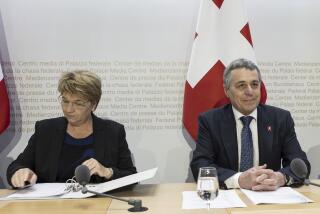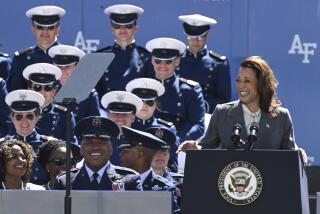Arafat Speaks Today; Security Tight : PLO Leader Expected to Press Moderate Line in Geneva
- Share via
GENEVA — The U.N. General Assembly prepared Monday to provide a forum for Palestinian leader Yasser Arafat, barred by the State Department from speaking in the United States.
Arafat, chairman of the Palestine Liberation Organization, addresses the world body today at the beginning of the General Assembly’s annual debate on the Palestinian issue. In an unprecedented move to convene a session away from its New York headquarters, the General Assembly voted to shift the debate here after U.S. Secretary of State George P. Shultz, citing national security grounds, refused to issue a visa to Arafat to visit U.N. headquarters in Manhattan.
The PLO chairman is receiving the red-carpet treatment of a world leader, and the Swiss have mounted their largest security force in memory to protect him.
Police, plainclothes officers and fur-hatted mountain troops stand on guard around the Palais des Nations, where the General Assembly will meet, and the Inter-Continental Hotel, where Arafat will stay tonight.
Barbed wire has been set up around the perimeter of the 25-acre U.N. meeting place, and helicopters buzz overhead. An estimated 600 international journalists are on hand to report Arafat’s speech today and his news conference Wednesday.
The cost of moving the General Assembly meeting to Geneva was about $440,000, according to U.N. officials.
Moderate Line Predicted
In his speech, Arafat is expected to pursue the moderate line toward Israel that he introduced at the Algiers conference of the PLO’s legislature last month and reaffirmed to a group of American Jews in Stockholm last week.
Israel, in turn, will attempt to rebut the Palestinian leader’s statements. The Israeli delegate to the United Nations’ Geneva headquarters declared Monday that his country “deeply regrets” the General Assembly’s invitation to Arafat to speak here.
“PLO statements cannot be taken at face value,” Ambassador Pinhas Eliav added.
But the Israeli view will be the minority opinion during the three-day debate on the Palestinian question, perhaps shared only by the U.S. delegation, headed by Ambassador Vernon A. Walters.
The Israeli Foreign Ministry has expressed serious concern that Arafat’s new, moderate tones--accepting the existence of the Jewish state and renouncing terrorism--are winning friends, even in the United States.
Washington, although demanding such concessions from Arafat as a condition for contacts with the PLO, maintains that the so-called Algiers Declaration last month did not meet the U.S. test because it was attached to conditions. In endorsing U.N. Security Council resolutions that implicitly recognize Israel, the PLO tied that to a demand for acceptance of Palestinian “self-determination,” or statehood. And in denouncing terrorism, the PLO said it retains the right to struggle against Israeli occupation of Arab territories.
Although Israeli officials dismiss the PLO’s moderate line as propaganda, the British Foreign Office, for the first time in five years, held talks with a top Arafat lieutenant, Bassam abu Sharif, last week. The British called the London talks “very helpful.”
Diplomatic observers say that Israeli Prime Minister Yitzhak Shamir’s staunch refusal to deal with the PLO may eventually cause diplomatic differences with Washington, if Arafat continues to preach moderation and recognition of Israel.
Shamir Cautioned
As the independent Israeli newspaper Haaretz put it on the eve of the Geneva talks:
“Yitzhak Shamir would be mistaken to close his eyes to the development process which the PLO is undergoing and dismiss Arafat’s words as fraudulent.
“If Arafat continues along the path he took in Stockholm during his Geneva appearance as well, the Israeli government will have to re-examine its traditional stand regarding the PLO.”
In the Israeli-occupied Gaza Strip, meanwhile, the Israeli army imposed an indefinite curfew Monday night ahead of Arafat’s speech, Reuters news service reported.
Security sources said the army will also restrict news coverage in the West Bank, closing off areas as needed to prevent Palestinian protests.
More to Read
Sign up for Essential California
The most important California stories and recommendations in your inbox every morning.
You may occasionally receive promotional content from the Los Angeles Times.









